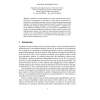Free Online Productivity Tools
i2Speak
i2Symbol
i2OCR
iTex2Img
iWeb2Print
iWeb2Shot
i2Type
iPdf2Split
iPdf2Merge
i2Bopomofo
i2Arabic
i2Style
i2Image
i2PDF
iLatex2Rtf
Sci2ools
120
click to vote
HPCN
1995
Springer
1995
Springer
Using optimistic execution techniques as a parallelisation tool for general purpose computing
Abstract. Optimistic execution techniques are widely used in the field of parallel discrete event simulation. In this paper we discuss the use of optimism as a technique for parallelising programs written in a general purpose programming language. We present the design and implementation of a compiler system which uses optimistic simulation techniques to execute sequential C ++ programs. The use of optimistic techniques is seen as a new direction in parallelisation technology: conventional parallelising compilers are based on static (compile–time) data dependency analysis. The reliance on static information imposes an overly restrictive view of the parallelism available in a program. The static view must always be the worst case view: if it is possible for a data dependency to occur, then it must be assumed always to occur.
Distributed And Parallel Computing | HPCN 1995 | Optimistic | Optimistic Execution Techniques | Optimistic Simulation Techniques |
Related Content
| Added | 26 Aug 2010 |
| Updated | 26 Aug 2010 |
| Type | Conference |
| Year | 1995 |
| Where | HPCN |
| Authors | Adam Back, Stephen Turner |
Comments (0)

